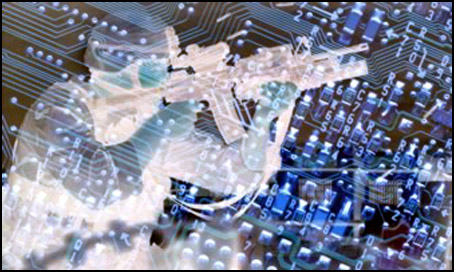
Karl Marx proclaimed that a “specter was haunting Europe.” But it took decades before the specter of socialism became a reality in the formation of the Soviet Union. Today, a “cyberspecter” haunts us. We better be alert to it because we don’t have decades to wait.
Cyberwar, computer hacking and the information revolution are well-worn and even hackneyed terms. The cyberattack against Estonia several years ago demonstrated how damaging hacking can be regardless of the source. The Pentagon reports large numbers of daily attempts to hack into or interfere with the U.S. Department of Defense’s computer and information systems.
Conceivably, a 10-year-old computer whiz can be as or more destructive than a government’s best expert in employing cyber for sport, gain or ideological purposes. So what is new and what should concern us? WikiLeaks sounds the alarm.
Pointedly coincident with the 69th anniversary of Japan’s surprise attack against U.S. forces stationed at Pearl Harbor was WikiLeaks’ release of potentially 250,000 classified and sensitive U.S. diplomatic cables. WikiLeaks had already dumped tens of thousands of official U.S. communications on Iraq and Afghanistan as well as an incendiary video showing American forces in Baghdad attacking and killing what turned out to be foreign journalists along with suspected Iraqi insurgents. Predictably, a media firestorm was provoked by the latest releases.
Yet, this specter could be a 21st-century equivalent of Pearl Harbor in which the strategic center of gravity isn’t battleship row but the vulnerability of governments to information and weapons of choice not bombers and torpedo planes but the Internet and cyber.
This particular cyber onslaught used information as a weapon of media destruction. Stunningly, subsequent retaliation by an independent network of as many as 10,000 hackers, ideologically disposed to help WikiLeaks, against servers operated by major corporations that halted access to these releases occurred.
The combination could be the precursor of 21st-century informational global conflicts and a jump to fifth- or sixth-generational warfare in which a huge corpus of invisible allies await the opportunity to join a cyberinsurgency as Internet warriors.
Suppose, for example, a WikiLeaks’ copycat attack went after national electrical grids, the banking system, air traffic control or some other weakness. Then, suppose that attack was joined by anonymous hackers in the thousands compounding the damage. Wow!
As significant, these leaks illuminate and magnify the hugely difficult issues inherent in countering cyber as a political weapon and in knowing how to react, prevent, regulate, hold accountable and indeed know when the use of information constitutes an act of war or a crime punishable under domestic or international law. If the United States has to rely on the 1917 Espionage Act to prosecute WikiLeaks, clearly we are far from prepared to deal with the cyber challenges of the 21st century.
The latest releases were far more revealing, embarrassing and indeed potentially dangerous in exposing individual identities and secret military information on sensitive and vulnerable installations than the earlier ones. Further releases may or may not follow. WikiLeaks and its fellow travelers assert their aim isn’t to punish but a more benign and benighted goal to expose the perfidy of governments.
My colleague and close friend Arnaud de Borchgrave, who is UPI editor at large, has already done important investigative work in analyzing the history and intent of WikiLeaks founder Julian Assange to harm the United States arising from a left-wing orientation and intense dislike of American democracy. And the alleged source of these leaks, a U.S. Army private, leaves observers dumbfounded as to how American security could be so incompetent to permit these thefts in the first place and then failing to realize they had happened.
Of course, overreaction is possible in predicting future consequences and in attempting to punish Assange and his comrades. On the other hand, as war has shifted from armies, navies and air forces battling like adversaries to what we are seeing in Afghanistan, the interconnectivity and dependence of so much of global commerce and interaction on electrons and the Internet produce potential vulnerabilities in the extreme. So far, while prodigious amounts of rhetoric have described these potential dangers, little progress has been made in producing a strategic, legal and political framework for dealing with the likes of Assange and even more pernicious characters such as cyber-savvy terrorists and religious extremists.
WikiLeaks has been a setback for the U.S. government. However, if we don’t move quickly with the intellectual equivalent of a Manhattan Project, the nation will be at grave risk. Governments will recover from the exposure of candid and sensitive exchanges among senior officials about opposite numbers. But taking down the power grid or financial system is a far different matter. WWW.worldwar5.0 is the new danger. Will we rise to meet this challenge.
Harlan Ullman is Senior Advisor at the Atlantic Council, Chairman of the Killowen Group that advises leaders of government and business, and a frequent advisor to NATO. This article was syndicated by UPI.
Image: cyber_warfare.jpg
